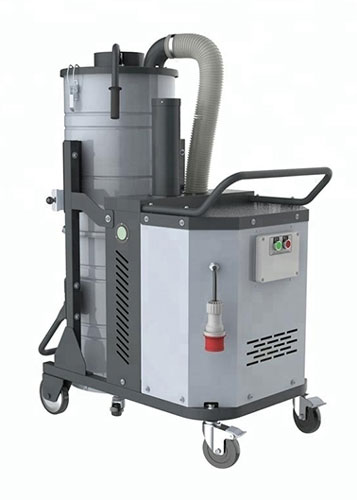What is an Industrial Vacuum Cleaner?
Industrial vacuum cleaner is an environmentally friendly cleaning equipment commonly used in industry. The equipment is used to collect waste, filter and purify the air in the industrial production process, and clean the dust and particles in the environment. Industrial vacuum cleaners are widely used in various fields such as textiles, chemicals, machinery, medicine, casting, etc., which can prevent some occupational disease hazards and improve production efficiency.
 Industrial vacuum cleaners can also absorb various metal, non-metal, oil, water and other particulate dirt and liquids, and can absorb toxic and harmful gases. If used in the textile industry, it can improve the quality of the product; in the chemical industry, it can recover some expensive catalysts. Moreover, as a kind of environmental protection equipment, industrial vacuum cleaners can effectively prevent the hazards of occupational diseases, such as the pneumoconiosis of welders.
Industrial vacuum cleaners can also absorb various metal, non-metal, oil, water and other particulate dirt and liquids, and can absorb toxic and harmful gases. If used in the textile industry, it can improve the quality of the product; in the chemical industry, it can recover some expensive catalysts. Moreover, as a kind of environmental protection equipment, industrial vacuum cleaners can effectively prevent the hazards of occupational diseases, such as the pneumoconiosis of welders.
Industrial vacuum cleaner uses AC power, which is relatively powerful. In general, industrial vacuum cleaners can be divided into two types: movable type and fixed type. Its working principle is to use a motor to drive a high-pressure fan (or use an integrated machine) to generate negative pressure in a limited volume, thereby generating suction. After the medium is sucked in, it is filtered through a filter bag or a filter barrel for secondary filtration. The ordinary type can only absorb water-containing dry media, and the wet and dry type can absorb oil and water produced during processing. After installing the exhaust pipe, the industrial vacuum cleaner can be used to absorb the smoke and gas generated during the production operation. The most significant industrial application of vacuum cleaners is the application in clean rooms.
The main components of the vacuum cleaner are vacuum pump, dust bag, hose and various nozzles of different shapes. It has an electric exhaust fan. After being powered, the exhaust fan runs at high speed to form an instant vacuum inside the vacuum cleaner, making the internal air pressure much lower than the air pressure outside. Under the action of this air pressure difference, dust and dirt will enter the vacuum cleaner barrel with the airflow, and then be filtered by the dust bag. Dust stays in the dust bag, and the purified air escapes into the room again through the motor, cooling the motor and purifying the air. As for the working principle of the wet and dry vacuum cleaner, it is different from the ordinary vacuum cleaner in that it has an extra centrifugal chamber. When dust, air, and water are sucked into the centrifugal chamber, the water with heavier weight is rotated at high speed to the inner wall of the centrifugal chamber and flows into the water collecting bucket below. The lighter dust and air enter the filter bag to filter the dust after passing through the centrifuge chamber. With the suction force, the vacuum cleaner sucks dust and dry dirt, such as threads, paper scraps, hairs, etc., from floors, carpets, walls, furniture and other surfaces that are not easy to clean with a broom. Its main components are vacuum pump, filter bag (or filter net), hose, long tube and nozzles of various shapes. Modern vacuum cleaners vary in accessories. In order to remove dirt from the carpet, modern vacuum cleaners are designed with coarse brushes, fine brushes, and rotating brushes. Flat nozzles are used for wall cleaning, and polishing brushes for floor cleaning.
Compared with household vacuum cleaners, industrial vacuum cleaners can be used continuously for 24 hours, and have the advantages of strong suction, large dust storage volume, long service life, and high temperature resistance. In particular, industrial vacuum cleaners have almost no requirements for suction. Waste media of various materials and shapes can be absorbed. By adjusting the filter media, such as filter elements, filter bags, etc., industrial vacuum cleaners can absorb solid particles with a precision of 0.1 micron, so they can be used in fine chemicals, precision machinery and other industries.

